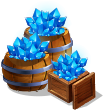Vol.4, Ch.2, P.4
“Phew…”
The sun was full-sunk. Skies blushed like watered wine.
With the last swing of sword practice swung, I drew a long breath and sheathed the blade of black. By now, I’d grown much acquainted with the increased intensity of my new regimen. Never a thing to be undervalued, healthful habits. Although sticking to them on the daily is the hardest part—and the most important.
“My!” cried a voice anear. “Rolf, your nose!”
“Ah, Emma,” I greeted. “Not to worry. Just sneezed a mite hard, I did.”
“Sneeze…?” my neighbour murmured with wonder and doubt, before a knowing look grew on her face. “Terrifying work, the military. Well, do have a care out there, Rolf. Oh, I much hope that husband of mine himself be not ‘sneezing’ his nose blue.” A wife worrying for her haphazard husband—ever the loving pair, my neighbours. If I’m to be honest, I quite envied their harmonious matrimony. “Ah! Before I forget,” said Emma, before presenting to me a large flagon. “Here you are, Rolf. A small something to warm the nights.”
“Oh?” I nearly gasped as I received the receptacle. Doubtless was it filled with a recent favourite of mine: meramjǫðr, a liquor of fermented mare’s milk. “My thanks, Emma,” I said. “A glad gift, this.”
“And glad am I that you savour it so,” Emma chuckled. “Even some of our folk find it… not much to their taste, you see.”
“For my part, it was love at first sip,” I assured her, earning a smile bright enough to bring the skies back to high noon.
After thanking Emma a second time, I then retired to my abode. A first this was to me, to have such a bond with a neighbour. Fresh it felt, warming my days as would a crackling hearth in the cold of winter. I ought return the warmth when next we meet. Perhaps a plate of potato pancakes would do?
∵
Having washed and supped, I poured myself a bowl of Emma’s meramjǫðr. Different from Alban’s collection of wines and spirits, this liquor of mare’s milk leaves one only lightly sotted at worst, making it a delight common even amongst the children and elderly of this land.
Bringing bowl to lip, I savoured a slow sip.
“Ah…”
Down it went, a shining stream washing away the day’s weariness. And quite the peculiar flavour it had, this milk. Roundly rich it was, bitter and sour in the best of ways; a true pleasure to the palate, and no doubt an unbeatable finisher for any long day.
A day such as this. Books and beverage, dealings with delightful folk… As though reminded, I then turned to the borrowed texts lying on the table and fancied a bit of reading before bed. But just as the thought happened, a knock came upon the front door.
“Hail,” called a voice outside. “Are you there, Rolf?”
Opening the door, I found afore me a familiar face. “Frank,” I greeted the fellow, himself the very husband to Emma. A brave of the Hensenite host, Frank was thus my subordinate, but being a good-natured neighbour above all else, he has ever maintained with me an upfront affability, both on and off duty. “What’s the matter at this hour?” I asked him.
“A matter of the missing,” Frank answered, his brows bent with trouble. “Remember you the young Gorkungen jarlshǫnd? Well, former jarlshǫnd? Left the walls she has for the wilderness. But dark though it is, she has made no return. Not as yet.”
A certain scream did my ears then recall, echoing, echoing. “You mean… Dita? The Edelfräulein?”
“That’s the name,” Frank nodded grimly. “Rolf. The winds blow uneasy. The braves are bestirred; much is awhirl. I thought to bear the news to you, just in case.”
Wilderness, was it? Then it was the plains spanning northwards beyond Hensen’s walls where Dušan’s daughter had gone. Only, such was no place for picnicking at this dark hour. Were it noon, Dita would be in no danger yet. But upon those plains, the setting of the sun oft beckons the behemót from their haunts.
“This is evil, Frank,” I remarked with growing dread. “There’s been a behemá—pardon, a vándýr prowling about of late, hasn’t there?”
“There has,” Frank answered. “A direbear… evil, for true.”
A lurker of the night, fell and nefarious—the direbear. Easily twice my own height, it is an ursal strain of behemá, true to its name, with thews enough to shatter a boulder as though it were an egg, and claws that could shred the surest trees. But the beast avoids us tallfolk not in the slightest, as its more mundane cousins are wont to do. No; it assaults us without hesitation, and savours our flesh with all hunger.
And so to meander under moonlight, far afield from protection of wall and watch, is to wind the noose about one’s neck.
“Understood,” I said, firm and grave. “Thank you, Frank.”
Wasting no time, I then girt myself with the svǫrtaskan, quit my abode, and made haste to Hensen’s northern walls.
∵
“It was noon,” so reported to me a guard at the gates. “She insisted on going alone, or so I have heard.” Further accounts were given. One claimed that another guard at the time had duly warned Dita of a direbear sighted around a rocky outcrop to the north-east. Like as not, he had allowed her through the gates, assuming a swift return after taking in the local vistas. “Hands gather for a search as we speak,” the guard assured me. “It starts soon.”
“Very good,” I said. “I’ll set out ahead. Send word to the others.” Mounted on steed, I then speeded through the gates and into the night.
Though she was no Hensenite herself, Dita ought’ve had wits enough to know what dangers lurked beyond the fólkheimr’s defences. Yet she’d ventured into the maw nonetheless, whilst lacking skill of either sword or spear, or any art of self-defence, for that matter—and with what company but her lonely thoughts. Indeed, this was not dared by fault of folly.
Calculating minds would sue to have her saved for the sake of the nascent alliance. We stood at a threshold, after all, a time like to be remembered by history itself. Were the Gorkungen jarl’s own daughter to be found eviscerated in Vílungen lands at the claws of an errant behemá, then surely shall it serve an augury against all our fortunes. And for why but the rumours certain to ensue: that unto a mark of enmity had Dita failed to deal death, and so sought her own.
Yet to this mind, all that was secondary: Dita deserved deliverance.
Of what woe it was that haunted her heart, of what bale it was that had birthed itself in her bosom, I knew.
Surely was she a gentle soul, Dita, having lived her life free from the foulness that was “hatred”. But one day was that hatred kindled asudden in her. Kindled, but uncontrolled, unreconciled, uncalmed. And so was she lost. Like a little child unto whom is handed most abruptly a burning torch. Not knowing how to handle such a flame, its heat harrows her hand, leaving her to stare at the wound with all despair.
And yet, when Dita had thrust the dagger of such hatred unto me, naught changed. When she next was drowned in misery and pressed to throat the same dagger, naught changed. For she couldn’t. Utterly cornered, she then thought to escape into the wild where the wicked ones roamed.
And have them finish what she’d started.
“There we are…” I murmured, spotting yonder a veritable herd of rocks, large and small, like teeth set against the moonlit horizon. Near the summit of one such molar—a singular stone that seemed more a miniature mountain—there stood the jarl daughter herself, tiny against the stars. Fraught was her foothold, four passūs high from the surety of the earth, as she clung precariously to the crags about her. And she seemed to be sobbing, as even from this distance could be seen glimmers trickling down her cheeks.
But at the base of the ponderous boulder loitered a lightless form: shrouded full in shadowy hide, an ursal behemá, huge in size.
A direbear beyond all doubt, one raising its snout to stare at Dita with deathly intent.
───────── ∵ ─────────











Comment (0)